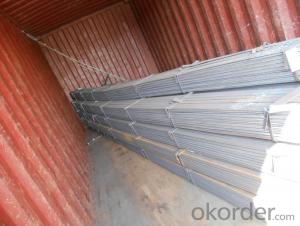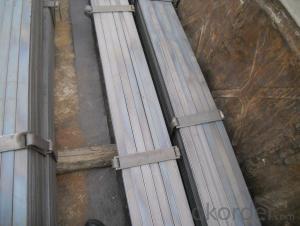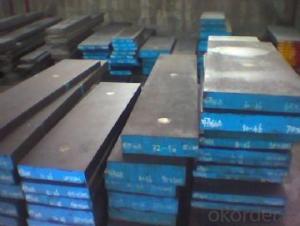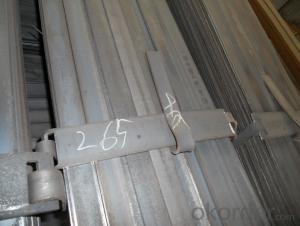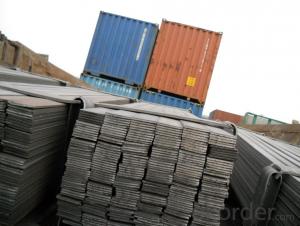Spring Steel Bar/billet/products JIS standard/Europe standard/ ASTM standard
- Loading Port:
- Shanghai
- Payment Terms:
- TT OR LC
- Min Order Qty:
- 20 m.t.
- Supply Capability:
- 1200 m.t./month
OKorder Service Pledge
OKorder Financial Service
You Might Also Like
Specifications
Spring steel flat bar
Garde: 60Si2Mn, 60Si2MnA, 55CrMnA,50CrVA
Standard GB,JIS,ASTM,DIN,AISI,BS
LF & VD forge;ISO&TUV appr
Materials
Q195,Q215,Q235B,Q345B,
S235JR/S235/S355JR/S355
SS440/SM400A/SM400B
Product Category
Metallurgy,Mineral &Energy
Technique
HOT ROLLED
Packing
1.Big OD:in bulk
2.Small OD:packed by steel strips
3.woven cloth with 7 slats
4.according to the requirements of customers
Usage
Mechanical&manufacture,Steel strcuture,
Shipbuilding,Bridging,Automobile chassis
Main market
Middle East,Africa, Asia and some Uropean country and America ,
Australia
Country of origin
China
Productivity
15000 Metric Tons pet Month
Remark
Payment terms :T/T ,L/C
Terms of trade :FOB ,CFR,CIF ,DDP,EXW
Minimum order : 10 tons
Lead time :on or before 3-15 working days .
- Q:What are the different applications of stainless special steel?
- Stainless special steel, which is also known as stainless steel, is a highly versatile material that is used in various industries because of its unique properties. Some examples of the different ways in which stainless special steel is utilized include: 1. Construction: Stainless steel is widely employed in the construction industry due to its exceptional durability and resistance to corrosion. It is used in structural components, bridges, building facades, and roofing materials. 2. Automotive industry: The automotive sector extensively utilizes stainless steel because of its strength, ability to withstand high temperatures, and durability. It can be found in exhaust systems, mufflers, catalytic converters, fuel tanks, and various other components. 3. Medical equipment: Stainless steel is the preferred material in the medical field because of its high resistance to corrosion and biocompatibility. It is used in the production of surgical instruments, implants, orthopedic devices, and medical equipment. 4. Food processing industry: Stainless steel is widely employed in the food industry because of its hygienic properties. It is used in the manufacturing of food processing equipment, storage tanks, food preparation surfaces, and utensils. 5. Aerospace industry: Stainless steel is utilized in the aerospace industry for its strength, ability to withstand high temperatures, and resistance to corrosion. It is used in the production of aircraft parts, engine components, and structural elements. 6. Chemical industry: Stainless steel is highly resistant to corrosion from various chemicals, making it suitable for applications in the chemical industry. It is used in the manufacturing of tanks, pipes, valves, and other equipment that come into contact with corrosive substances. 7. Energy sector: Stainless steel is used in the energy industry for various purposes. It is employed in the construction of power plants, oil and gas refineries, pipelines, and renewable energy systems such as wind turbines and solar panels. 8. Marine industry: Stainless steel is extensively used in marine environments because of its excellent resistance to corrosion. It is used in the production of boat fittings, propellers, underwater structures, and offshore platforms. 9. Household appliances: Stainless steel is commonly used in household appliances because of its attractive appearance, durability, and resistance to stains and scratches. It can be found in kitchen appliances such as refrigerators, ovens, dishwashers, and washing machines. 10. Art and design: Stainless steel is increasingly being employed in art installations, sculptures, and architectural designs because of its aesthetic appeal, versatility, and ability to withstand outdoor conditions. In conclusion, stainless special steel is utilized in a wide range of industries due to its durability, resistance to corrosion, strength, ability to withstand high temperatures, and aesthetic appeal. It plays a crucial role in construction, automotive, medical, food processing, aerospace, chemical, energy, marine, household appliances, and artistic fields.
- Q:How is mold steel used in the production of plastic injection molds?
- Mold steel is used in the production of plastic injection molds as it provides the necessary hardness, durability, and heat resistance required for the molding process. It ensures the molds can withstand the high pressures and temperatures involved in plastic injection molding, allowing for the precise and efficient production of plastic parts.
- Q:What are the different coating techniques used for special steel?
- There are several different coating techniques used for special steel, including hot-dip galvanizing, electroplating, powder coating, and thermal spraying. Each technique has its own advantages and applications, providing enhanced protection against corrosion, improved aesthetics, or increased durability depending on the specific requirements of the steel.
- Q:How does special steel perform in terms of corrosion resistance in marine environments?
- Special steel, also known as stainless steel, performs exceptionally well in terms of corrosion resistance in marine environments. The high levels of chromium and nickel present in the alloy composition of special steel make it highly resistant to corrosion caused by saltwater and other corrosive elements present in marine environments. The chromium content in special steel forms a protective oxide layer on its surface known as the passive layer. This passive layer acts as a shield, preventing the steel from coming into direct contact with corrosive elements. It effectively blocks oxygen and moisture from reaching the underlying steel, thereby inhibiting corrosion. Additionally, the presence of nickel in special steel enhances its corrosion resistance even further. Nickel improves the stability of the passive layer and increases its ability to self-repair if it gets damaged. This property makes special steel highly reliable and long-lasting in marine environments, where exposure to saltwater, high humidity, and varying temperatures can accelerate corrosion processes. Furthermore, special steel offers excellent resistance to pitting corrosion and crevice corrosion, which are common types of corrosion encountered in marine environments. Pitting corrosion occurs when localized areas of the steel's surface are attacked, resulting in small pits or holes. Crevice corrosion occurs in confined spaces such as gaps or joints, where stagnant water or debris can accumulate and accelerate corrosion. Special steel's resistance to these types of corrosion ensures its durability and integrity in marine applications. Overall, special steel demonstrates outstanding corrosion resistance in marine environments due to its high chromium and nickel content. Its ability to form a protective passive layer, resist pitting and crevice corrosion, and self-repair makes it a preferred choice for various marine applications, including shipbuilding, offshore structures, and seawater desalination plants.
- Q:How does special steel perform in surface hardening applications?
- Special steel performs exceptionally well in surface hardening applications. Due to its unique composition and properties, it can undergo various surface hardening processes like carburizing or nitriding, resulting in enhanced surface hardness, wear resistance, and overall durability. This makes special steel an ideal choice for applications where high strength and improved surface properties are required, such as in automotive components, cutting tools, or industrial machinery.
- Q:How does special steel perform under low temperatures?
- Special steel generally performs well under low temperatures. It has good toughness and ductility, which allows it to withstand cold temperatures without becoming brittle or losing its structural integrity. This makes it suitable for various applications in industries such as aerospace, oil and gas, and automotive, where low-temperature environments are encountered.
- Q:How is special steel used in the chemical industry?
- Special steel is used in the chemical industry for various applications due to its exceptional corrosion resistance, high temperature strength, and durability. It is commonly used to manufacture equipment such as pressure vessels, storage tanks, pipelines, and reactors that handle corrosive substances or operate under extreme conditions. Additionally, special steel alloys are utilized in the production of catalysts, valves, and pumps, ensuring reliable and efficient performance in chemical processes.
- Q:How does special steel contribute to the manufacturing of aerospace components?
- The unique properties and characteristics of special steel make it an essential material in the manufacturing of aerospace components. Its exceptional strength, durability, and ability to withstand extreme temperatures and corrosion make it ideal for various applications in the aerospace industry. A major benefit of special steel in aerospace manufacturing is its capacity to endure high stress and pressure. During flight, aerospace components such as turbine blades, landing gear, and structural supports face tremendous forces. Special steel's strength and toughness enable these components to withstand these forces without failure, ensuring the safety and reliability of the aircraft. Moreover, special steel's resistance to extreme temperatures is crucial in the aerospace industry. For instance, aircraft engines operate at extremely high temperatures. Special steel alloys, like those containing nickel or cobalt, are used to manufacture components such as turbine discs and combustion chambers. These alloys can withstand the intense heat, preventing deformation or failure and ensuring optimal engine performance and efficiency. Additionally, special steel's resistance to corrosion is vital for aerospace applications. Aircraft are constantly exposed to harsh environmental conditions, including moisture, chemicals, and saltwater. Special steel alloys, such as stainless steel, exhibit high resistance to corrosion, preventing degradation and maintaining the structural integrity of aerospace components over time. This is particularly critical for crucial parts like fuel tanks, hydraulic systems, and airframe structures. In conclusion, special steel plays a significant role in the manufacturing of aerospace components by providing strength, durability, resistance to extreme temperatures, and corrosion resistance. Its unique properties guarantee the safety, reliability, and longevity of aerospace systems, making it an indispensable material in the aerospace industry.
- Q:What are the applications of special steel in the aerospace industry?
- Special steel is widely used in the aerospace industry for various applications. It is utilized in the manufacturing of aircraft components such as engine parts, landing gear, fasteners, and structural components. Special steel exhibits excellent strength, corrosion resistance, and heat resistance, making it ideal for withstanding the extreme conditions experienced during flight. Additionally, it offers high fatigue resistance, crucial for ensuring the long-term durability and safety of aircraft. These properties make special steel indispensable in the aerospace industry, contributing to the overall performance, reliability, and safety of aircraft.
- Q:What are the main alloying elements in special steel?
- The specific type or grade of special steel can determine the main alloying elements present. Chromium, nickel, molybdenum, vanadium, tungsten, and cobalt are common alloying elements in special steel. These elements are incorporated into the steel to improve its properties, including corrosion resistance, strength, hardness, and heat resistance. Each alloying element has a distinct impact on the steel, enabling the development of specialized steel grades for diverse applications in industries like aerospace, automotive, oil and gas, and construction.
1. Manufacturer Overview |
|
|---|---|
| Location | |
| Year Established | |
| Annual Output Value | |
| Main Markets | |
| Company Certifications | |
2. Manufacturer Certificates |
|
|---|---|
| a) Certification Name | |
| Range | |
| Reference | |
| Validity Period | |
3. Manufacturer Capability |
|
|---|---|
| a)Trade Capacity | |
| Nearest Port | |
| Export Percentage | |
| No.of Employees in Trade Department | |
| Language Spoken: | |
| b)Factory Information | |
| Factory Size: | |
| No. of Production Lines | |
| Contract Manufacturing | |
| Product Price Range | |
Send your message to us
Spring Steel Bar/billet/products JIS standard/Europe standard/ ASTM standard
- Loading Port:
- Shanghai
- Payment Terms:
- TT OR LC
- Min Order Qty:
- 20 m.t.
- Supply Capability:
- 1200 m.t./month
OKorder Service Pledge
OKorder Financial Service
Similar products
New products
Hot products
Related keywords
